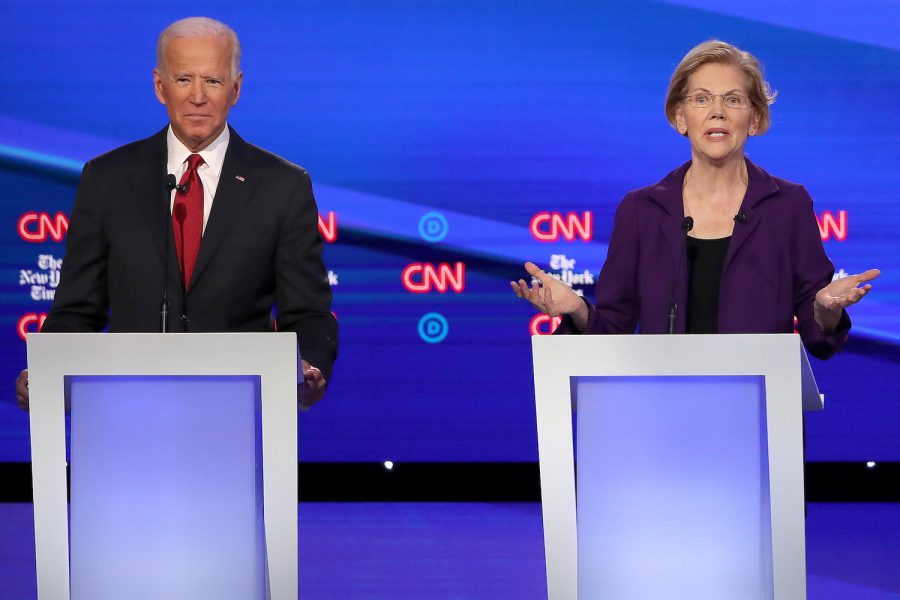Iowa Democrats react to health insurance, jobs topics in 2020 presidential debates
In the sixth Democratic presidential debate, the candidates heavily focused on health care policies and jobs, topics important to Iowans ahead of the first-in-the nation caucuses.
Former Vice President Joe Biden and Sen. Elizabeth Warren (D-Mass.) during the Democratic Presidential Debate at Otterbein University on Tuesday, Oct. 15, 2019, in Westerville, Ohio. (Win McNamee/Getty Images/TNS)
October 15, 2019
Because of the current privatization of Medicaid in Iowa, Eric Donat said he can’t afford maintenance on his wheelchair. Although he is an undecided caucusgoer, he said he strongly favors California Senator Kamala Harris’ health-care plan, because she focuses on the needs of disabled individuals.
“Kamala Harris actually directly talks about disability issues in her stump speeches,” Donat said in a phone interview from the Black Hawk County Democratic headquarters, where he was attending a watch party for the October Democratic debates Tuesday night. “I think she does a pretty good job with having a consistent performance (in the presidential debates).”
Health-care coverage and jobs were two of many issues the 12 candidates sparred over in the sixth Democratic presidential debates and are two policy areas Iowa Democrats say are most important when making a decision for president.
Candidates debate health-care policies
Health care has been a contentious topic among the Democratic candidates, with some supporting Medicare for All and other candidates wanting Medicare, the government-run health insurance system for those over the age of 65, to function as a public option.
Sen. Bernie Sanders, I-V.t., has said Medicare for All will raise middle-class taxes, and South Bend, Indiana Mayor Pete Buttigieg and Minnesota Senator Amy Klobuchar insisted the public-option plan will better cover Americans without disrupting people’s private insurance.
Tom Courtney, the current Democratic County Chair of Des Moines County and 2020 candidate for a state Senate seat he previously represented, said he thought the candidates were getting “waylaid” with arguments over different health-care systems.
“The way I see it in Iowa, Iowans are concerned with Medicare, and if a Democrat is elected, we are going to get some help with our Medicare bills,” he said. “I think they’re getting way into the weeds — into the minutia.”
The percentage of Iowans without health-care coverage has gradually decreased since 2008, from 11.9 percent to 6.4 percent in 2019. Black and hispanic communities have the largest number of Iowans who are uninsured, with 13.9 percent of blacks and 25 percent of hispanics without health care.
Steve Drahozal, Democratic County Chair of Dubuque County, said he appreciates Democrats’ efforts to provide health care for all citizens but would like to see more detailed plans, especially from Joe Biden.
“Candidates were definitely on the offense against Sen. Warren, since she’s the new frontrunner,” Drahozal said. “I like the fact that Mayor Pete and Vice President Biden debated Warren and Sanders about the best way to cover this.”
A recent Des Moines Register/CNN/Mediacom poll shows Warren polling at 22 percent in Iowa, with Biden closely behind at 20 percent in a statistical dead heat.
Candidates talk jobs and economic issues
Warren and Sanders have often touted a wealth-tax plan that would increase taxes for the top 1 percent in order to invest in social programs such as student-loan forgiveness and free child care. Others like California Senator Kamala Harris support a tax credit for middle-class families.
In Iowa, the minimum wage has stayed at $7.25 an hour since it was last raised in January 2008. Iowa’s unemployment rate reached 2.7 percent in August, the lowest since 2000. In Iowa City, the unemployment rate as of August 2019 is 2.1 percent, similar to the statewide percentage.
The candidates talked about the threat of automation on American jobs, a signature talking point of entrepreneur Andrew Yang, who proposed a $1,000 a month universal basic income for American adults.
Sanders suggested that a federal jobs guarantee with proposals such as the Green New Deal would protect American workers from automation.
Other candidates said the threat of automation is overblown, and the outsourcing of labor by major corporations is what is hurting American workers. Kurt Meyer, the chair of the Tri-County Democrats, said automation may have taken away some jobs, but he said he agreed with Warren that it is not the driving factor in economic unrest.
“The key issue seems to be that jobs aren’t paying a living wage,” Meyer said. “That’s a much greater issue than technology moving people out of employment.”




